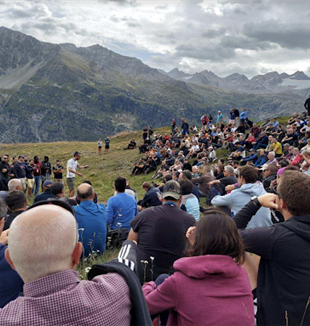
Shockingly Beautiful
Struck by the encounter with shocking beauty at the International Assembly of Responsibles in La Thuile, Bishop Mark from Chicago relates the memoir “A Severe Mercy” to what he encountered there.It was nostalgia that tricked me into reading all of Sheldon Vanauken's A Severe Mercy. The book begins with a midnight expedition to a vantage point where the widowed Vanauken can contemplate a certain country house shining in the moonlight. The house conjures Vanauken's enchanted childhood, but nobody he loves lives there anymore. All gone, a long time before. Although intellectually suspicious of nostalgia, I grow weak in moonlight, so I read beyond Chapter One.
In the days just before La Thuile I was on retreat with the bishops of Region VII. The land where Vanauken's house once stood is now a suburb of Indianapolis, but in the Diocese of Lafayette; so the subject came up in a conversation with the bishops of both dioceses. What I wanted to communicate to them was my enthusiasm for the unsentimental way Vanauken pops the bubble he blew so carefully in Chapter One; how humbly he lays out for the reader his slow road to becoming a man. No moonlight, no enchantment, no dream sequence. It is the story of his hard road to mature faith in Christ, and therefore, his hard road to the demanding embrace of what is real.
The bishops' retreat ended on the day I flew to Italy. A lot of La Thuile sailed over my head because I still speak neither Italian nor Giussani. I came because of the allure of that mix of worldliness and innocence I have discovered in my friends who belong to Communion and Liberation ("it's like Opus Dei for #%!&")! I am susceptible to nostalgia, as I have said: susceptible to nothingness. In La Thuile I hoped to discover more of whatever this is makes innocence accountable to experience, keeping it real.
On the first morning I got on a ski lift with a shy Milanese medical student who sat between me and a Kazakh with a Cheshire grin and a funny story involving a bishop and guano. An hour's hike later I was sitting near the top of a small bowl in front of the Alps, listening to a couple hundred people being conducted in the soft, sweet singing of "mountain songs": era una notte che pioveva (it was a rainy night). Later I learned that the Kazakh was abandoned by his parents as a baby and, at 18, was turned out of the orphanage where he was raised, with no education or life skills to speak of. He practices law now. Also up there in the bowl, just barely inside the frame of the last seconds of a half-minute video I shot to capture the beauty of the moment, is a Navy helicopter pilot who agonizes (I think that is not too strong a word) over her desire to bear witness to Christ among the 700 other sailors she sails with for months at a time. And so forth: this one got sobering news from the pediatrician; that one's marriage fell apart. They were all smiling. One after another had encountered God's love, incarnate in some disciple or other, which led to the recovery of everything they had thrown away, or feared lost forever, or perhaps never dreamed of. "Behold! I make all things new." This is why the crossed humanity of Christ is so important, according to the Fathers: whatever is not assumed, is not redeemed. And if humanity is assumed by Christ and therefore redeemed, why not smile?
One public witness that flew over my head in La Thuile, but which pierced the hearts of everyone who heard it, was that of a grieving young man who said that in the light of knowing the One who makes all things new, he would not choose to turn back the clock to the time before he became a widower, because "that would not be enough." Shockingly beautiful. Which brings me back to A Severe Mercy. In giving the book its title, Vanauken acknowledges the huge debt he owes to C.S. Lewis, both in his initial conversion and his ongoing formation as a disciple. The title is a gauntlet thrown down before us by one who finally understands what Jesus meant when he said, "I call you friends." That is all I am going to say about the book. If what I write succeeds in piquing your interest, dear reader, please be sure to get your hands on an edition that includes Lewis' letters to the author. Read to the bitter (sweet!) end.
Bishop Mark, Archdiocese of Chicago